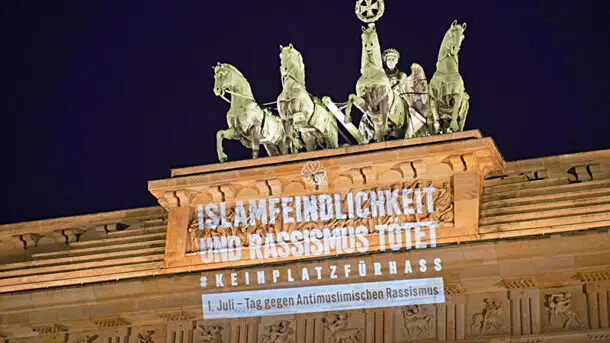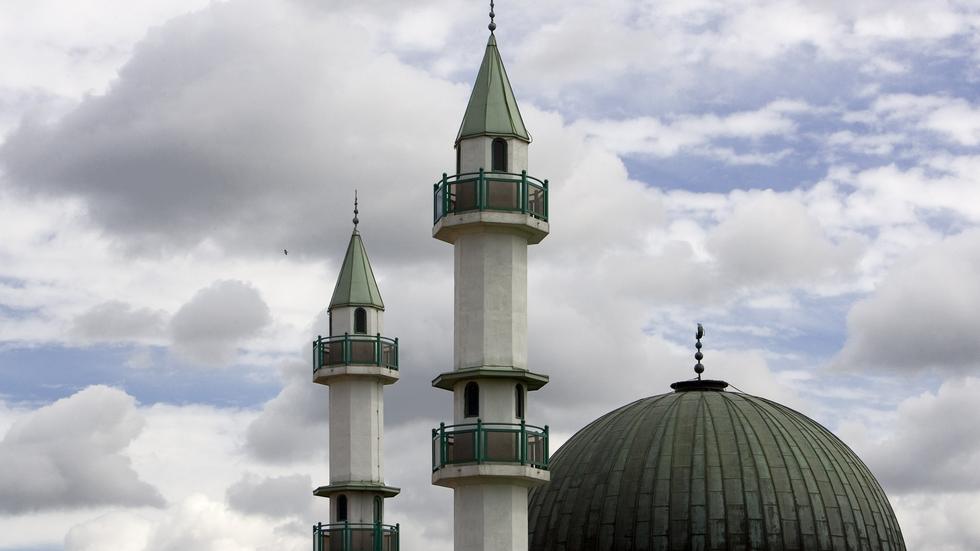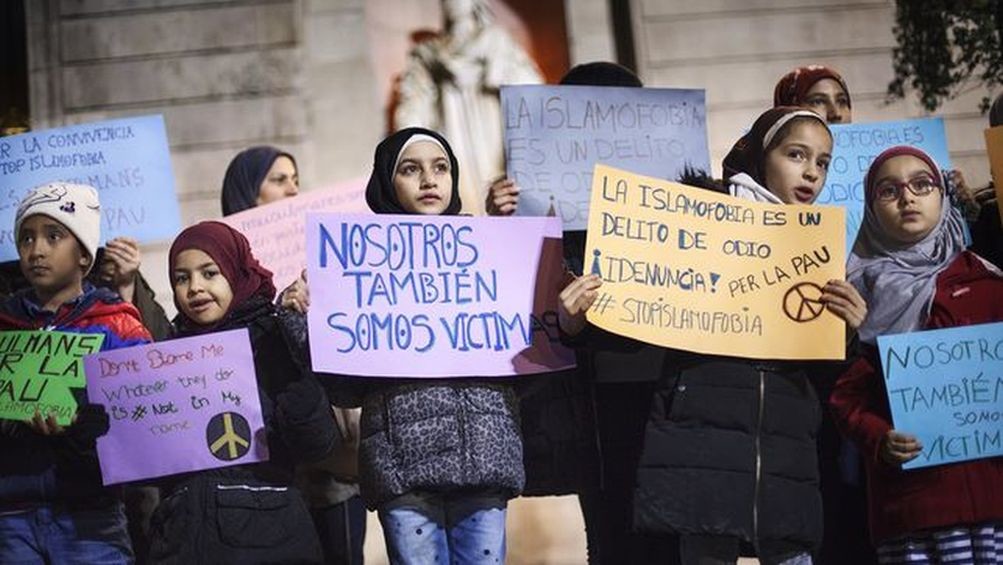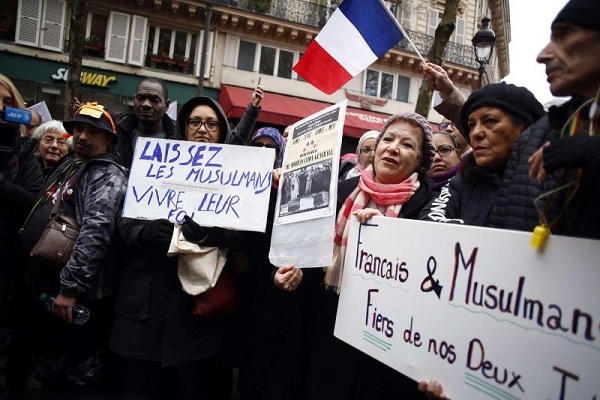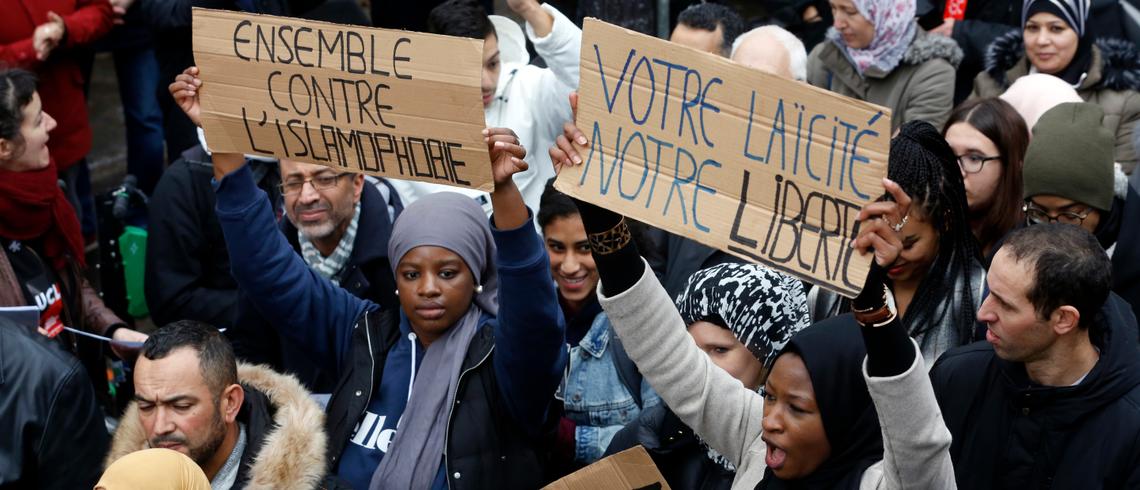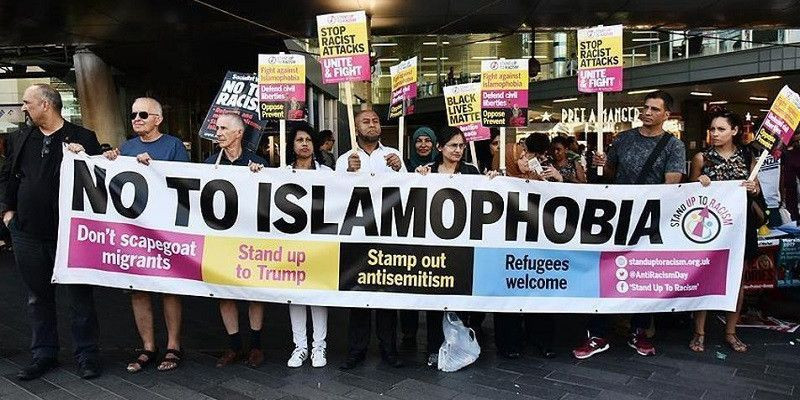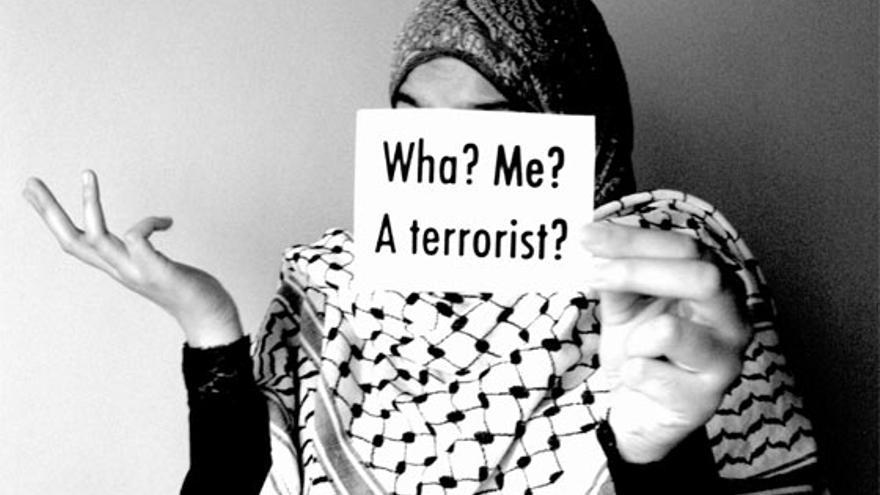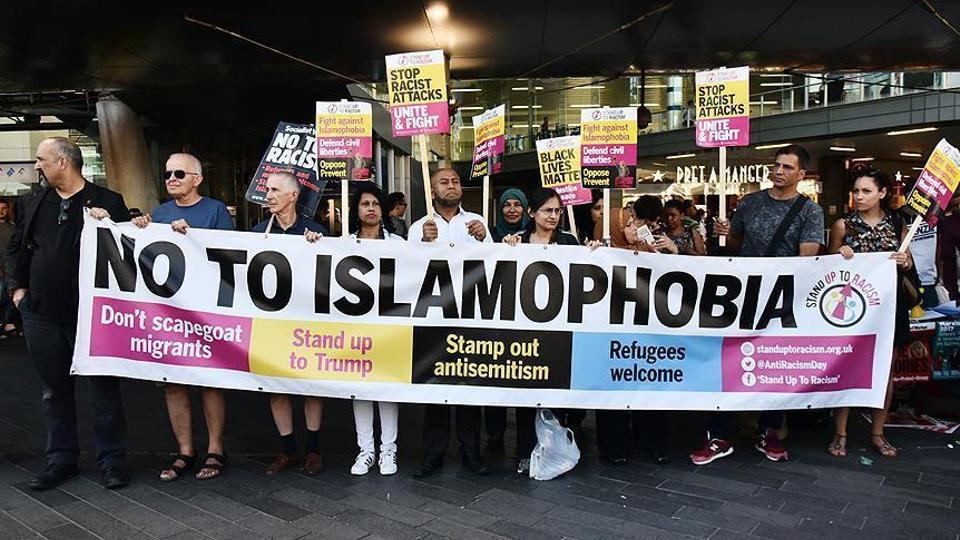Für den Kampf gegen den Hass fordert der Islamophobiereport 2021 von der Bundesregierung, mehr für Bildung, den Kampf gegen Gewalt und die Sichtbarkeit von Minderheiten zu tun.
(iz). Seit sieben Jahren wird der jährliche europäische „Islamophobiareport“ von den Politologen Enes Bayraklı und Dr. Farid Hafez herausgegeben. In jedem Band schreiben AutorInnen aus Forschung und Zivilgesellschaft über einzelne Länder.
In Hinblick auf die Bundesrepublik kommt der Autor (der Politik- und Religionswissenschaftler Zubair Ahmad) zu einem ambivalenten Bild. Obwohl die Zahl der „politisch motivierten Verbrechen“ inmitten einer globalen Pandemie um 23,17 Prozent angewachsen ist, gingen „islamophobe Vorfälle“ um 28,65 Prozent zurück. Ahmad sprach von insgesamt 732 Fällen aus dem vorliegenden Themenbereich.
2021 hätten „diskursive Events“ ihre Spuren hinterlassen. In ihnen seien MuslimInnen und Islam als „gefährlich, bedrohlich und konfliktiv“ geframt worden. Als Beispiele nennt er die aus Österreich importierte Debatte über den „politischen Islam“ sowie Vorstellungen einer „konfrontativen Religionsausübung“. Immer noch seien rassistische Einstellungen bei uns prävalent.
In Bezugnahme auf Erkenntnisse des DeZIM (Mai 2022) glauben 49 Prozent der Befragten an die Existenz „menschlicher Rassen“, während ein Drittel von der Überlegenheit mancher ethnischer Gruppen überzeugt ist. Andererseits erkennt eine große Mehrheit der befragten Deutschen die Existenz von Rassismus an. 61 Prozent sieht ihn als alltägliche Realität, während 22 Prozent selbst einmal rassistische Diskriminierung erleben mussten.
Parallel zu abstrakten Einstellungen in der Bevölkerung (wie sie durch die Leipziger Autoritarismus-Studie dokumentiert werden) sahen die letzten Jahre eine „enorme Zunahme“ an Angriffen auf MuslimInnen in Deutschland. Seit 2017 werden solche Vorfälle gesondert vom Bundesinnenministerium erfasst. Allerdings kam es in den Pandemiejahren 2020 und 2021 zu einem signifikanten Niedergang; die absolute Mehrheit der Täter stammt aus dem rechtsextremen Milieu. Kritisch merkt der Bericht an, dass die Bundesgeneralanwaltschaft bisher kein Verfahren in dieser Hinsicht eröffnet habe.
Eine Schlüsselrolle im öffentlichen Diskurs hat für den Autor der Begriff des und die Debatte über den „Politischen Islam“. Verschiedene Stimmen haben sich kritisch mit dem Konstrukt auseinandergesetzt, das zu einem Kollektivverdacht gegen MuslimInnen und der Einschränkung ihrer Grundrechte führe sowie eine negative Projektionsfläche sei. Die zitierte Islamwissenschaftlerin Gudrun Krämer bezeichnete Vorstöße wie in Österreich, unter dem Schlagwort „politischer Islam“ gesonderte Rechtsverstöße zu kreieren, als „absurd“, solange rechtskonforme Begriffsdefinitionen fehlten. Trotz dieser Kritik veröffentlichte die Union ein Positionspapier, das sich auf dieses Vorbild beziehe. Darin werde der Begriff verwendet, um Muslime und Islam als Sicherheitsbedrohung darzustellen. Gleichzeitig würden ansonsten extreme Verschwörungstheorien einer muslimischen Unterwanderung wiederholt.
Positiv merkt der Report an, dass die Bundesregierung entscheidende Schritte „im Kampf gegen Rassismus, rechten Extremismus, Antisemitismus und Antiziganismus“ unternommen habe. Trotzdem würde die Nutzung des Begriffs „politischer Islam“ eine Verbindung zwischen Religiosität, Kriminalität und Gefährlichkeit schaffen. Darüber hinaus fehle es in der Gesellschaft, die sich des Rassismus bewusst sei, an der Anerkennung von strukturellen Diskriminierungen.
Zur Bekämpfung von antimuslimischer Diskriminierung wurden unter anderem diese Handlungsempfehlungen ausgesprochen: Stärkung der Menschenrechtsbildung, koordinierte Strafverfolgung und Anklage islamfeindlicher Straftaten, ausreichende Ausstattung der Antidiskriminierungsstelle des Bundes sowie eine größere Repräsentation von Menschen mit Migrationshintergründen in relevanten Sektoren der Gesellschaft.
Högaktuella European Islamophobia Report 2021 visar en lång rad varningssignaler om att rasismen mot muslimer ökar runtom i Europa, och särskilt oroande är utvecklingen i Sverige. Rapportens Sverigedel, som skrivits av docent Emin Poljarevic, doktorand Anna Ardin samt mig själv, visar hur särskilt myndigheters och förvaltningars förhållningssätt gentemot muslimska civilsamhällesgrupper och organisationer präglas av ett snabbt växande godtycke.
Den antimuslimska radikaliseringen såväl i nätets ytterkanter som i politikens finrum har ihärdigt fortsatt att växa. När nu de konservativa partierna har börjat samarbeta med Sverigedemokraterna riskerar en lång och pågående historia av aggressiv islamofobisk retorik och politik att bli än mer legitim i många väljares ögon.
Giorgia Meloni, referent del partit postfeixista Germans d’Itàlia, estava exultant. La seua formació havia aconseguit imposar-se a les eleccions celebrades fa unes setmanes a l’estat transalpí. Acompanyada a la coalició per Forza Itàlia, liderada per l’incombustible magnat Silvio Berlusconi, i per la ultradretana Lliga de Matteo Salvini, Meloni assumia el càrrec de primera ministra casualment a tocar del centenari de la marxa de Roma, bressol de l’accés del feixisme al govern d’Itàlia en la segona dècada del segle passat. L’extrema dreta, d’aquesta manera, sumava un altre èxit després dels resultats dels Demòcrates de Suècia al país escandinau. Els règims il·liberals d’Hongria i Polònia comptarien amb un nou aliat per defensar la seua agenda d’odi.
Admiradora en el passat del dictador feixista Benito Mussolini, la cap de Germans d’Itàlia va fer diverses afirmacions durant l’estiu on defensava una teoria de la conspiració sobre una substitució ètnica a Europa, unes idees que fins fa poc només circulaven pels grupuscles neonazis d’arreu d’Occident. L’auge electoral de l’extrema dreta, tanmateix, ha atorgat força a uns discursos farcits, entre altres elements, d’un component d’islamofòbia. «L’islam està complint el paper que va ocupar durant els anys trenta el judaisme. És cert que l’antisemitisme continua tenint pes ideològic, però la islamofòbia està substituint actualment l’antisemitisme. Està sorgint un supremacisme d’estil supervivent, basat en l’amenaça de la teoria del gran reemplaçament», afirmava el periodista especialitzat en moviments ultradretans Miquel Ramos en un dossier del setmanari EL TEMPS sobre la ideologia que hi havia rere les accions terroristes de l’extrema dreta.
Amb les forces reaccionàries espanyoles com ara Vox jugant a islamofòbia amb atacs contra els menors no acompanyats de fora de les fronteres estatals, les veus especialistes Inés Bolaños, investigadora del departament Ciències Polítiques i Social de l’Institut Universitari Europeu, i Sergio Gracia, director del Centre d’Investigació de l’Extrema Dreta (CINVED), han radiografiat l’estat d’aquesta problemàtica a l’Estat espanyol dintre de l’informe anual de perspectiva europea que elaboren els professors universitaris Farid Hafez i Enes Bayrakly. Publicat a mitjan setembre i amb un període d’anàlisi que compren l’any 2021, adverteixen de l’augment de casos d’islamofòbia en el bienni 2017-2019. Si en l’any 2017 van registrar-se 546 incidents, en 2019 la xifra s’havia incrementat fins als 1.706. Només entre 2018 i 2019 va haver-hi una pujada del 6,8%.
«El discurs de la inseguretat impulsat per l’extrema dreta, esbossat anteriorment, ha tingut un impacte directe a escala de barri. Des de fa uns anys, s’ha produït un augment en la quantitat de delictes d’odi comesos, siguen atacs físics o verbals contra negocis o llocs de culte. Al llarg de 2021, s’han produït diferents accions que han causat víctimes, han posat en perill la vida d’altres persones o han provocat danys estructurals o en béns privats», ressalten, per citar atacs com ara «l’apedregada de la Mesquita de l’Antiga a Fuerteventura». «Pocs dies després, es va produir una agressió contra un centre per a joves immigrants a Torredembarra (Catalunya), al qual li va seguir un altre contra la Mesquita de San Javier, a Múrcia, que va ser víctima del vandalisme, cremada i van fer-se grafitis amb les paraules ‘Mort a l’Islam’», exemplifiquen.
L’exhibició d’un cap de porc a una mesquita de Múrcia acompanyada de les pintades «Stop a la invasió» i «No a l’Islam», l’assassinat a tirs d’una persona d’origen marroquí a una cafeteria d’una població murciana i l’agressió d’un jove al seu company àrab quan va ser expulsat de la feina completen el llistat d’incidents islamòfobs registrat a la mateixa autonomia. «Tots aquests esdeveniments van tenir lloc a la Regió de Múrcia, on diversos grups neonazis operen i exhibeixen obertament símbols prohitlerians. A principis de setembre, un home va ser agredit enfront d’un restaurant de menjar ràpid, mentre esperava la seua comanda. L’agressor li va cridar: ‘Creus en Al·là?’. Més tard, al novembre, un fiscal va denunciar al líder del grup neonazi Bastió Frontal, per animar a la violència contra persones marroquines i musulmanes durant una manifestació enfront de l’ambaixada del Marroc a Espanya», reforcen a l’informe ambdós investigadors.
El retrat confeccionat inclou referències a les discriminacions laborals experimentades per aquest col·lectiu, així com les vulneracions de la seua llibertat religiosa amb l’ús del vel a l’escola i les ineficiències del sistema judicial per evitar que les persones amb aquestes creences siguen víctimes de diferents discriminacions. També recull diverses accions dels partits d’extrema dreta amb caràcter islamòfob: «Durant les eleccions municipals a Madrid, el partit d’extrema dreta va mostrar cartells contra els Menors Estranger no Acompanyats en la xarxa de metro de la ciutat. Aquest anunci de campanya va contribuir a alimentar l’odi en Internet durant les eleccions de Madrid. A més, una diputada del mateix partit va protagonitzar un vídeo on presentava els musulmans de Ceuta, una ciutat espanyola en la costa nord d’Àfrica, com una amenaça per a la cultura cristiana».
Link: https://www.eltemps.cat/article/18114/islamofobia-persistent
France has started the process of shutting down the Obernai mosque in the Bas-Rhin area. But this isn’t the first time it has done so.
Since 2020, there have been at least 23 reported closures of mosques around the country, in what critics say is a direct action against French Muslims, who make up six percent of the total population.
France’s Minister of the Interior and Overseas Gerald Darmanin revealed this on his Twitter, saying, “At the request of the President of the Republic, the fight against Islamist separatism continues. In the past two years, 23 separatist places of worship have been closed.”
This growing anti-Muslim sentiment across France’s political spectrum has been a cause of concern for rights activists and organisations.
In almost all of the instances of mosque closures, representatives of the mosques say the French government has provided inadequate public evidence about the grounds for their decisions.
A Reuters report from earlier this year talks about how an array of powers that rights activists, international organisations – including the United Nations – and members of the Muslim community say give authorities carte blanche to close down places of worship without proper scrutiny and with procedures so opaque the case can’t be overturned.
“It’s Kafkaesque,” Fionnuala Ni Aolain, a UN special rapporteur on the protection of human rights while countering terrorism, told the news agency of the legal procedures used in such cases, which can include evidence where the source isn’t identified.
“The flirtation with secretive evidence is in itself worrying, but it also breaches provisions in international treaties relating to the right to a fair trial and equality before the law.”
Controversial anti-separatism law
When the French authorities decided to shut down the Obernai mosque, they cited its prayer leader, or imam, of being “radicalised”, further accusing the person of carrying out “radical preaching activities, taking a hostile attitude towards French society and making provocative comments against the values of the republic”.
It is the controversial anti-separatism law that allows the authorities a free hand in targeting French Muslims by using a much-criticised concept of “separatism”.
Since the implementation of the law, which has received criticism from many observers including rights defenders, academics and activists, the life of Muslims in France has come under strict scrutiny.
The critics of the law call it “restrictive and repressive” in nature.
Moreover, the newly released European Islamophobia Report 2021, mentions in its executive summary for the state of anti-Muslim sentiment in France that “this law, which is supposed to provide a strong response against ‘terrorism’ and ‘radical Islam’, has in fact provoked a violent crackdown on Muslim visibility and organisation”.
“It affects first the most visible Muslims by extending the ban on religious symbols to many other spaces and criminalises any attempt to organise independent Muslim worship and fight Islamophobia by carrying out abusive closures.”
One of the crucial findings in the report states that the arbitrary closure or dissolution of many Islamic bodies such as associations, schools, mosques, restaurants or publishing houses has very often been justified by unconvincing reasons.
“It is also important to question the intentions of the French government in implementing a policy that goes so far as to criminalise Muslimness,” the report says.
“Islamophobia in France is primarily the result of the state, which seeks to establish an ‘Islam of France’ which removes self-determination from French Muslims to make them ‘Muslims without Islam’.”
France has started the process of shutting down the Obernai mosque in the Bas-Rhin area. But this isn’t the first time it has done so.
Since 2020, there have been at least 23 reported closures of mosques around the country, in what critics say is a direct action against French Muslims, who make up six percent of the total population.
France’s Minister of the Interior and Overseas Gerald Darmanin revealed this on his Twitter, saying, “At the request of the President of the Republic, the fight against Islamist separatism continues. In the past two years, 23 separatist places of worship have been closed.”
This growing anti-Muslim sentiment across France’s political spectrum has been a cause of concern for rights activists and organisations.
In almost all of the instances of mosque closures, representatives of the mosques say the French government has provided inadequate public evidence about the grounds for their decisions.
A Reuters report from earlier this year talks about how an array of powers that rights activists, international organisations – including the United Nations – and members of the Muslim community say give authorities carte blanche to close down places of worship without proper scrutiny and with procedures so opaque the case can’t be overturned.
“It’s Kafkaesque,” Fionnuala Ni Aolain, a UN special rapporteur on the protection of human rights while countering terrorism, told the news agency of the legal procedures used in such cases, which can include evidence where the source isn’t identified.
“The flirtation with secretive evidence is in itself worrying, but it also breaches provisions in international treaties relating to the right to a fair trial and equality before the law.”
Controversial anti-separatism law
When the French authorities decided to shut down the Obernai mosque, they cited its prayer leader, or imam, of being “radicalised”, further accusing the person of carrying out “radical preaching activities, taking a hostile attitude towards French society and making provocative comments against the values of the republic”.
It is the controversial anti-separatism law that allows the authorities a free hand in targeting French Muslims by using a much-criticised concept of “separatism”.
Since the implementation of the law, which has received criticism from many observers including rights defenders, academics and activists, the life of Muslims in France has come under strict scrutiny.
The critics of the law call it “restrictive and repressive” in nature.
Moreover, the newly released European Islamophobia Report 2021, mentions in its executive summary for the state of anti-Muslim sentiment in France that “this law, which is supposed to provide a strong response against ‘terrorism’ and ‘radical Islam’, has in fact provoked a violent crackdown on Muslim visibility and organisation”.
“It affects first the most visible Muslims by extending the ban on religious symbols to many other spaces and criminalises any attempt to organise independent Muslim worship and fight Islamophobia by carrying out abusive closures.”
One of the crucial findings in the report states that the arbitrary closure or dissolution of many Islamic bodies such as associations, schools, mosques, restaurants or publishing houses has very often been justified by unconvincing reasons.
“It is also important to question the intentions of the French government in implementing a policy that goes so far as to criminalise Muslimness,” the report says.
“Islamophobia in France is primarily the result of the state, which seeks to establish an ‘Islam of France’ which removes self-determination from French Muslims to make them ‘Muslims without Islam’.”
There are major forces within Europe normalising Islamophobia with liberal democracies such as Austria, Denmark, and France amongst the worst culprits, according to a new report.
The 664-page ‘European Islamophobia Report 2021’ report highlights Islamophobia in employment, education, media, the legal system, and politics in 27 European countries.
Last year’s report focussed on France’s hostility towards Muslims. This year, the attention turned to Austria and its former chancellor Sebastian Kurz.
“The Islamophobia becoming normalised and institutionalised by liberal democracies such as Austria, Denmark, and France is alarming,” says the report.
“While the Macron government is continuing with its crackdown on Muslim associations and mosques, many of the measures taken and laws implemented by the Austrian government have been largely defeated by the justice system. Yet, the victims of these policies remain traumatised and left to deal with the repercussions of their haunting experiences,” it adds.
This is the sixth edition of the annual report. For this year’s edition, 35 experts from the academic world and civil society contributed to the coverage of the 27 European countries.
Austria & Sebastian Kurz
The report says the state of Islamophobia in Europe continues to be problematic, with many policies being further implemented, such as the dissolution of Islamophobia watchdog organisations in France.
“Such developments show the end of a journey, built on Islamophobic exclusions, for politicians,” says the report.
“This is why we have chosen Sebastian Kurz’s portrait for the cover of this year’s edition of the European Islamophobia Report. Kurz, who was hailed as a one-time political wunderkind by domestic Austrian and international media, came to power by making Islam and Muslims his number one target in election campaigns.
“More than that, he was the leader of a conservative government that implemented one anti-Muslim policy after the other, from hijab bans to the closure of mosques. ”
Kurtz was forced to step down at the end of 2021 following allegations of corruption.
The report adds: “His political ‘career’ can be read as a textbook example of hegemonising Islamophobia and, at the same time, of how empty populism which is essentially built on anti-Muslim racism can end. Sebastian Kurz accumulated immense power by scapegoating and securitising Muslims, which in the end turned out only to be a screen to hide alleged corruption and increasing authoritarianism.”
Liberal democracy decline fuels Islamophobia
The persistence of anti-Muslim racism should be seen against the backdrop of the decline of liberal democracy in Europe, according to the report.
Politics remains the essential driver of Islamophobia in Europe, while the internet is a place of wide dissemination of hate speech, it adds.
It says ‘political Islam’ or the Muslim Brotherhood is a weapon used by Islamophobes to silence and exclude Muslims from the public sphere.
The report does look at some positive trends with several European and international institutions taking small steps towards fighting Islamophobia, such as the UN declaration of 15 March as ‘International Day to Combat Islamophobia.’
In some countries with a small number of Muslims, like the Czech Republic, the report says there seems to be a trend of decreasing anti-Muslim hate crime and Islamophobic political discourse.
It says this is due to the decreasing relevance of immigration issues compared to 2015, when this trend was at its peak and politicised, and the far right’s attention turning to ‘covid totalitarianism.’
Recommendations
Based on its findings, the report emphasised three specific recommendations to policymakers and political institutions.
- It urges European countries to “bring life and energy” to the unanimously accepted resolution of the United Nations declaring March 15 as International Day to Combat Islamophobia.
- It wants European institutions to take the European Commission against Racism and Intolerance’s “General Policy Recommendation No. 5 on preventing and combating anti-Muslim racism and discrimination” seriously and to implement it.
- European and national institutions should take the findings of the European Union’s Agency for Fundamental Rights as presented in the “Directive (EU) 2017/541 on Combating Terrorism – Impact on Fundamental Rights and Freedoms” seriously and recognise the damage of anti-terrorism legislation on Muslim communities across Europe.
You can read the full report here (PDF)
Sentimen anti-Muslim tetap menjadi ancaman yang berkembang di seluruh Eropa, dengan beberapa negara memberlakukan kebijakan yang telah berkontribusi pada pelembagaan masalah yang seharusnya dihilangkan dengan segera, sebuah laporan baru memperingatkan.
Menurut Laporan Islamofobia Eropa 2021 pada hari Kamis (23/9/2022), sentimen anti-Muslim adalah “masalah yang mendesak” di seluruh benua seperti tahun-tahun sebelumnya.
Dikatakan negara-negara seperti Inggris dan Prancis menjadi “tempat utama kebencian anti-Muslim dan insiden Islamofobia.”
“Selanjutnya, kampanye anti-Muslim dari partai sayap kanan di negara-negara anggota UE mendominasi diskriminasi terhadap individu dan komunitas Muslim,” kata laporan itu, yang berfokus pada 27 negara Eropa dan disiapkan dengan kontribusi dari 35 akademisi dan pakar terkemuka di bidangnya. .
Laporan tersebut menghubungkan kegigihan rasisme anti-Muslim dengan “latar belakang tren umum yang mengkhawatirkan: penurunan demokrasi liberal di Eropa.”
Ini memperingatkan bahwa kekuatan besar di Eropa, terutama negara-negara seperti Prancis, masih “berinvestasi lebih sedikit dalam memerangi Islamofobia, dan lebih banyak … ke dalam normalisasi Islamofobia.”
“Islamofobia menjadi normal dan dilembagakan oleh demokrasi liberal seperti Austria, Denmark, dan Prancis mengkhawatirkan,” kata laporan itu.
Terlepas dari insiden anti-Muslim di seluruh Eropa, laporan tersebut merinci diskriminasi sistemik yang dihadapi oleh umat Islam di semua bidang kehidupan, mulai dari pekerjaan hingga perawatan kesehatan, pendidikan, dan sistem peradilan.
Islamofobia dalam Jumlah
Austria
Sebanyak 1.061 kejahatan kebencian anti-Muslim tercatat di Austria. Sebagian besar kasus itu online (68 persen), berasal dari politisi (32 persen), dan berada di ranah publik (25 persen).
“Sebagian besar pelaku adalah laki-laki (76,9 persen) dan korban utamanya adalah perempuan (69 persen),” kata laporan tersebut.
Mengutip data dari pengawas anti-rasisme lain ZARA, laporan itu mengatakan 1.977 tindakan rasis dan anti-Muslim didokumentasikan, yang terutama menargetkan wanita.
Belgium
Wanita menanggung beban serangan anti-Muslim dan rasis di Belgia.
Dikatakan, 89 dari semua kasus yang dilaporkan ke Collective for Inclusion and Against Islamophobia di Belgia berkaitan dengan sentimen anti-Muslim terhadap perempuan.
Finlandia
Sebanyak 852 kejahatan rasial tercatat pada tahun 2020.
“Sebagian besar kejahatan rasial (88,5 persen) disebabkan oleh kebangsaan-etnis (75,8 persen) dan agama (12,7 persen),” kata laporan itu.
Prancis
Ada 213 insiden anti-Muslim yang tercatat di Prancis pada tahun 2021.
“Di antara mereka, setengah (109) menyangkut kerusakan tempat ibadah Muslim, pusat budaya, dan kuburan, dan 22 persen menyangkut serangan terhadap orang,” kata laporan itu.
Dikatakan tahun 2021 melihat “tingkat kekerasan yang lebih tinggi di Prancis baik dalam hal bahasa (dengan wacana Islamofobia yang semakin penuh kebencian dan mengkhawatirkan) dan pendekatan (dengan undang-undang yang menekan Muslim yang religius, terlihat, terorganisir dan vokal) — sebuah kekerasan yang menyoroti tempat kedua yang diberikan kepada Muslim Prancis di negara mereka sendiri.”
Jerman
Ada 732 kejahatan anti-Muslim yang terdaftar di seluruh Jerman tahun lalu, menurut laporan itu.
Ini termasuk 54 kasus serangan terhadap masjid dan 43 insiden di mana individu menjadi sasaran.
Yunani
Laporan itu mengatakan 14 kasus insiden anti-Muslim tercatat di Yunani pada tahun 2021.
“Politik, agama, media (baik cetak maupun online), dan Internet terus menjadi empat ranah utama yang memainkan peran penting dalam reproduksi Islamofobia di ranah publik Yunani sepanjang 2021,” bunyi laporan tersebut.
“Islamofobia di Yunani diekspresikan terutama oleh partai politik dan politisi kanan dan ekstrem kanan tertentu, neo-liberal (memproklamirkan diri), tokoh Gereja Ortodoks Yunani, media cetak dan elektronik, dan jurnalis termasuk posting mereka di media sosial.
Spanyol
Spanyol telah mengalami lonjakan 41 persen dalam kejahatan rasial selama lima tahun terakhir.
“Dari kejahatan ini, 678 (37,6 persen) bermotivasi rasial atau xenofobia,” kata laporan itu, mengutip data Kementerian Dalam Negeri Spanyol.
Swedia
Ada 996 kasus berdasarkan alasan agama antara 2017 dan 2021 di Swedia, sementara jumlah keseluruhan kejahatan rasial selama periode tersebut mencapai 14.710.
“Namun, sebagian besar pengaduan diskriminasi agama berhubungan langsung dengan diskriminasi etnisn berjumlah 4.298 selama periode ini,” kata laporan itu.
“Anak-anak Muslim terlalu terwakili dalam statistik yang diterbitkan oleh badan kesehatan masyarakat Swedia, di mana hampir 20 persen anak-anak non-Eropa, telah mengalami perlakuan kasar karena latar belakang etno-religius mereka dan lebih dari 15 persen telah mengalami diskriminasi di sekolah.”
Swiss
Mengutip angka dari Kantor Statistik Federal Swiss, laporan itu mengatakan 12 persen populasi menunjukkan sikap bermusuhan terhadap Muslim, sementara 34 persen cenderung percaya stereotip negatif tentang komunitas tersebut.
Inggris
Ada “peningkatan berkelanjutan dalam jumlah keseluruhan kasus yang dilaporkan” di Inggris, dengan pihak berwenang mencatat kenaikan 9 persen dari 2020 hingga 2021.
Setidaknya 45 persen dari semua kejahatan kebencian yang “diperburuk oleh agama” melibatkan orang-orang yang beragama dan berlatar belakang Muslim.
Jumlah kejahatan ini telah meningkat sebesar 291 persen dalam 10 tahun terakhir, kata laporan itu.[ros]
¿Está creciendo la islamofobia en España? Esa es la pregunta a la que ha tratado de responder el investigador cordobés Sergio Gracia, director del Centro de Investigación de la Extrema Derecha (Cinved) en su análisis para el European Islamophobia Report (EIR), un informe que se publica anualmente desde el año 2015 y que analiza la situación de la población musulmana en Europa.
Gracia, colaborador habitual de este periódico, ha debutado este año como analista de este prestigioso informe. Lo ha hecho de la mano de Inés Bolaños Somoano. Juntos han estudiado la evolución del odio contra la población musulmana e islámica en España en el año 2021, y sus conclusiones son, como poco, preocupantes, pues detectan un auge de este tipo de odio.
En términos generales, Bolaños y Gracia recurren a diversas fuentes, entre ellas las estadísticas de delitos de odio del Ministerio del Interior. En España, según revela el EIR, Interior no desglosa por tipo de delito, por lo que no pueden mostrar los delitos de odio específicos contra los musulmanes. En cualquier caso, sí detectan que en los últimos cinco años ha habido un aumento del 41% en los delitos de odio, y que de todos ellos, el 37,6% fueron de motivación racial o xenófoba.
Además, el informe del Observatorio Español del Racismo y la Xenofobia (Oberaxe) sobre el discurso de odio en los medios sociales sí recoge un aumento de entre el 9,5% y el 14,7% en el discurso de odio islamófobo. Paralelamente, la OSCE incluye 45 incidentes por motivos religiosos en su informe de 2020.
Algunos de estos incidentes son de sobra conocidos y se reseñan en el informe. En 2021 hubo dos asesinatos y un apuñalamiento a personas musulmanas en la región de Murcia, donde, según el informe, “operan varios grupos neonazis que exhiben abiertamente símbolos prohitlerianos”. Se trata del asesinato de Momoun Koutaibi a golpes con una barra de hierro en Alhama de Murcia; la muerte de Younes Bilal en Mazarrón, tras recibir tres disparos en un bar; o el apuñalamiento de un hombre de 40 años de origen marroquí en Cartagena.
También en Murcia la mezquita de San Javier, fue vandalizada, quemada y finalmente grafiteada con las palabras “Muerte al Islam”. Y, más allá de la región levantina, en 2021 hubo más incidentes violentos, como la agresión a un hombre en Madrid al que le preguntaron “¿Crees en Alá?”, antes de golpearle.
Islamofobia en el discurso político
En términos generales, Gracia y Bolaños explican que la pandemia ha acrecentado los delitos de odio en torno al diferente, utilizando y señalando a este como chivo expiatorio, y que para ello, el principal medio de difusión fueron las redes sociales, donde se ha generado un discurso que “ha sido potenciado y legitimado por el creciente movimiento ultraderechista”.
Éste, según los investigadores, “ha utilizado a la inmigración como catalizador para sacar lo peor de la sociedad”. La extrema derecha ha explotado la islamofobia creando en torno a ella un discurso del miedo, vendiendo una supuesta amenaza de nuestros privilegios, y recuperando para ello “el discurso anti islámico que campa por nuestro país desde los años 90”, lamentan Gracia y Bolaños en el informe, en el que recuperan algunos de los discursos políticos islamófobos pronunciados en España en 2021.
Aluden concretamente a las palabras del presidente del partido político Vox en Ceuta, que dijo: “El Partido Popular (PP) se ha entregado a la ‘marroquinización’ de Ceuta”. También recuerdan las declaraciones del portavoz de Vox en la Asamblea de Ceuta, Carlos Verdejo, quien se dirigió a la diputada Fatima Hamed diciendo que “es una fanática de los libros, una antisemita y una racista”, y afirmó que el diputado Mohamed Alí, “al no criticar al rey (Mohamed VI), demuestra dónde están sus lealtades”.
También recuerdan las acciones islamófobas dirigidas directamente a la comunidad musulmana española que ha protagonizado Vox, como la de las elecciones catalanas, enmarcados en la campaña “Stop Islamización” del partido, que acabaron provocando el cierre temporal de su cuenta oficial de Twitter; o la de las elecciones municipales de Madrid, en las que el partido “exhibió carteles contra los inmigrantes MENA (Menor Extranjero no Acompañado) en la red de metro de la ciudad” . Además, recuerdan que una diputada del mismo partido protagonizó un vídeo en el que presentaba a los musulmanes de Ceuta como una amenaza para la “cultura cristiana”.
Las mujeres musulmanas sufren discriminación múltiple
Si bien Gracia y Bolaños recuerdan que en España no hay limitaciones a prácticas islámicas tan polémicas como el hijab o el burka, sí que recalcan que los gobiernos y los partidos políticos “aplican o exigen una legislación que se dirige directamente a los musulmanes como sujetos religiosos, tratándolos de forma diferente a los miembros de otras comunidades religiosas”. Esto, señalan, tiene efectos en cuestiones como la educación o los centros de trabajo.
“Los centros educativos aprovecharon o crearon nuevos ‘códigos internos’ que prohíben el uso del velo islámico dentro de sus instituciones. Las mujeres han sido discriminadas por llevar el hiyab en el lugar de trabajo, habiendo tenido éxito en el proceso de selección para una plaza antes de los casos de discriminación”, afirma el informe, que recuerda casos como el de Farah, una alumna de 13 años de Guadalajara que denunció problemas al llevar el hiyab, o Hana, que demandó a su instituto en Málaga, ya que el centro no le permitía acudir a clase con su velo, debido a la normativa interna.
“La dirección del centro le dijo a Hana que por ‘razones higiénicas’ no podía llevar nada en la cabeza. Su discurso se justificó utilizando el reglamento interno de la escuela, que comparaba el hiyab con cualquier otro accesorio de moda, violando así los derechos fundamentales de Hana”, remarcan los investigadores, que concluyen que las mujeres musulmanas sufren “discriminación múltiple: como mujeres, a veces como inmigrantes, y siempre como musulmanas”.
Para ello ponen como ejemplo el caso de Dina, una mujer catarí que, a finales de junio de 2021, fue seleccionada para un puesto de trabajo, sólo para recibir días después la noticia de que el consejo de administración de la empresa le exigía que renunciara a su velo islámico, ya que afectaba a la “naturaleza secular de la empresa”.
Islamofobia Online y en medios de comunicación
Con las redes sociales como principal medio transmisor del odio, el informe le dedica una buena parte a sus efectos en España. Según los datos recabados por Gracia y Bolaños, la islamofobia constituyó entre el 9,5 y el 14,7% de todo el discurso de odio registrado en 2021 en las redes, con un aumento del 4,6% respecto a los años anteriores.
En muchos casos, las redes además se valen de presuntos reportajes o noticias que caen en la pura islamofobia. Los investigadores no dudan en apuntar que hay varios medios de comunicación con fuertes vínculos con partidos políticos y movimientos sociales de extrema derecha que “promueven el discurso de odio contra el islam creando y distribuyendo noticias falsas o desinformación sobre el mismo”. Entre estos medios, Gracia y Bolaños citan a Caso Aislado, Estado de Alarma, Mediterráneo Digital, Libertad Digital, EsRadio, Periodista Digital y OKDiario.
Además, hablan abiertamente de un movimiento islamófobo en España en el que destacan personalidades como el periodista Javier Esparza, periodista; la escritora Isabel San Sebastián, el eurodiputado de Vox Herman Tertsch, la cofundadora de Vox y periodista de Estado de Alarma Cristina Seguí, el periodista Javier García Isac, la política Yolanda Couceiro, el impulsor de Estado de Alarma Javier Negre, y el periodista Federico Jiménez Losantos, entre otros.
El reto: denunciar la islamofobia
Para los investigadores, la difusión de noticias falsas en internet supone una importante fuente de polarización que está detrás del aumento de los incidentes islamófobos en España. En este ámbito, Gracia y Bolaños concluyen que, dado que los tribunales españoles no pueden o carecen de los recursos necesarios para abordar esta cuestión, es necesario y urgente poner en marcha una institución supranacional que pueda perseguir estos delitos de odio en todos los países de la Unión Europea, incluida España.
De puertas para dentro, ambos consideran que “el mayor reto de España en la lucha contra los delitos de odio es la grave falta de denuncias. Sólo un porcentaje muy pequeño de los afectados por incidentes discriminatorios acaba informando o denunciando los hechos”. Además, frente a “la desconfianza cada vez más extendida hacia el islam y los musulmanes”, defienden que “la sociedad española necesita también talleres, coloquios y charlas en los que los afectados por la discriminación puedan exponer sus experiencias a los estudiantes y, en general, a los ciudadanos españoles”.
Finalmente, consideran necesaria una distribución equitativa de los estudiantes musulmanes entre la población escolar para mejorar la integración general en el país. En este ámbito, el informe detalla que la mayor población estudiantil musulmana se concentra en Andalucía, Cataluña, Madrid y Valencia.
A nivel global, los musulmanes suponen el 4% de la población, con alrededor de 2 millones, de los cuales el 42% tiene nacionalidad española, según el Observatorio Andalusí 2019
El European Islamophobia Report (EIR) es un informe anual publicado desde 2015, que cubre casi todos los países europeos. El EIR, coordinado por Farid Hafez y Enes Bayrakli, brinda a los legisladores, académicos, líderes comunitarios y lectores comunes una mirada sobre el racismo antimusulmán en Europa.
Der „European Islamophobia Report (EIR)“ für das Jahr 2021 wurde am Donnerstag veröffentlicht. Herausgegeben wird der Report zum siebten Mal von den Politikwissenschaftlern Dr. Farid Hafez und Enes Bayraklı. Der Report beleuchtet die islamfeindlichen Entwicklungen in Schlüsselbereichen von 27 europäischen Ländern wie Beschäftigung, Bildung, Medien, einschließlich Internet, und Politik. Diese wurden von insgesamt 35 Wissenschaftlern, Experten und Aktivisten der Zivilgesellschaft aus verschiedenen europäischen Ländern zusammengetragen und verfasst.
Der Bericht bietet politischen Entscheidungsträgern, Wissenschaftlern, Führungspersönlichkeiten der Gemeinden und normalen Lesern eine Sammlung von europaweiten Analysen zum antimuslimischen Rassismus.
Das Titelbild des diesjährigen Berichts zeigt den ehemaligen österreichischen Bundeskanzler Sebastian Kurz, der als „politisches Wunderkind“ galt, jedoch während seiner Amtszeit eine „antimuslimische Politik nach der anderen umsetzte“. Angefangen vom Kopftuchverbot bis zu Moscheeschließungen, heißt es im Bericht.
Politik erkennt Islamfeindlichkeit
Erwähnenswert war laut dem Bericht, dass die europäische und internationale Politik die steigende Islamfeindlichkeit als Problem wahrnehme. So veröffentlichte die Europäische Kommission im Dezember 2021 eine politische Empfehlung zur Verhinderung und Bekämpfung von antimuslimischem Rassismus und Diskriminierung. Außerdem haben die Vereinten Nationen eine von Pakistan im Namen der Organisation für Islamische Zusammenarbeit (OIC) vorgelegte Resolution, die den 15. März zum „Internationalen Tag zur Bekämpfung von Islamfeindlichkeit“ erklären soll, einstimmig angenommen.
Deutschland: Muslime als Zielscheibe
Gleichwohl wurde das Jahr 2021 von verschiedenen diskursiven Ereignissen beherrscht, die immer wieder Muslime und den Islam als bedrohliche, gefährliche und konfliktträchtige Figuren darstellten, vor allem in Deutschland. Die Debatte um den „politischen Islam“ dominierte nach Österreich auch den Diskurs in Deutschland. Des Weiteren wurde in Deutschland ein Kopftuchverbot für Beamtinnen durch die Hintertür erlassen, in dem der Bundestag das „Gesetz zur Regelung des Erscheinungsbilds von Beamtinnen und Beamten sowie zur Änderung weiterer dienstrechtlicher Vorschriften“ aktualisiert hat.
Nach aktuellen Schätzungen wurden in Deutschland 55.048 politisch motivierte Straftaten begangen, von denen 23.604 einen rechtsextremen Hintergrund hatten. Außerdem wurden 732 islamfeindliche Straftaten erfasst, von denen 54 Angriffe auf Moscheen verübt worden sind.
Link: https://www.islamiq.de/2022/09/23/european-islamophobia-report-2021-veroeffentlicht/
Anti-Muslim sentiment remains a growing threat across Europe, with several countries enacting policies that have contributed to the institutionalisation of an issue that should instead be stamped out with urgency, a new report has warned.
According to the European Islamophobia Report 2021 on Thursday, anti-Muslim sentiment was “as pressing a problem” across the continent as it was in previous years.
It said countries such as the UK and France became “the main spots of anti-Muslim hatred and Islamophobic incidents.”
“Furthermore, anti-Muslim campaigns of far-right parties in EU member states dominate the discrimination against Muslim individuals and communities,” the report said, which focused on 27 European countries and was prepared with contributions from 35 leading academics and experts in the field.
The report links the persistence of anti-Muslim racism to “the backdrop of a general worrisome trend: the decline of liberal democracy in Europe.”
It warns that major forces within Europe, singling out countries like France, are still “investing less in the fight against Islamophobia, and more … into normalising Islamophobia.”
“The Islamophobia becoming normalised and institutionalised by liberal democracies such as Austria, Denmark, and France is alarming,” the report said.
Apart from anti-Muslim incidents across Europe, the report details systemic discrimination faced by Muslims in all areas of life, from employment to health care, education and the justice system.
READ MORE: Islamophobia in Europe is at a ‘tipping point’, new report warns
Islamophobia in numbers
Austria
As many as 1,061 anti-Muslim hate crimes were recorded in Austria.
Most of the cases were online (68 percent), came from politicians (32 percent), and were in the public sphere (25 percent), the report said.
“The vast majority of perpetrators were male (76.9 percent) and the victims were primarily women (69 percent),” it added.
Citing data from another anti-racism watchdog ZARA, the report said 1,977 racist and anti-Muslim acts were documented, which primarily targeted women.
Belgium
Women bore the brunt of anti-Muslim and racist attacks in Belgium, according to the report.
It said 89 of all cases reported to the Collective for Inclusion and Against Islamophobia in Belgium pertained to anti-Muslim sentiment against women.
Finland
A total of 852 hate crimes were recorded in 2020.
“Most of the hate crimes (88.5 percent) were due to national-ethnic origin (75.8 percent) and religion (12.7 percent),” the report said.
France
There were 213 anti-Muslim incidents recorded in France in 2021.
“Among them, half (109) concern damage to Muslim places of worship, cultural centres, and cemeteries, and 22 percent concern attacks on persons,” the report said.
It said 2021 saw “a higher level of violence in France both in terms of language (with increasingly hateful and worrying Islamophobic discourses) and approach (with laws repressing religious, visible, organised and vocal Muslims) — a violence that highlights the secondary place granted to French Muslims in their own country.”
Germany
There were 732 anti-Muslim crimes registered across Germany last year, according to the report.
These included 54 cases of attacks on mosques and 43 incidents where individuals were targeted.
Greece
The report said 14 cases of anti-Muslim incidents were recorded in Greece in 2021.
“Politics, religion, media (both printed and online), and the Internet continued to be the primary four realms playing a significant role in the reproduction of Islamophobia in the Greek public domain throughout 2021,” read the report.
“Islamophobia in Greece was expressed primarily by certain political parties and politicians of the right and extreme right, (self-proclaimed) neo-liberals, figures of the Orthodox Church of Greece, printed and electronic media, and journalists including their posts on social media.
Spain
Spain has seen a surge of 41 percent in hate crimes over the past five years.
“From these crimes, 678 (37.6 percent) were racially motivated or xenophobic,” the report said, citing Spanish Interior Ministry data.
Sweden
There were 996 cases based exclusively on religious grounds between 2017 and 2021 in Sweden, while the overall number of hate crimes over the period stood at 14,710.
“However, most complaints of religious discrimination were directly related to ethnic discrimination numbering 4,298 during this period,” the report said.
“Muslim children are over-represented in statistics published by the Swedish public health agency, where almost 20 percent of non-European children, have experienced abusive treatment due to their ethno-religious background and more than 15 percent have experienced discrimination in school.”
Switzerland
Citing figures from Switzerland’s Federal Statistical Office, the report said 12 percent of the population exhibited hostile attitudes toward Muslims, while 34 percent tended to believe negative stereotypes about the community.
UK
There was “a continuing increase in the overall number of reported cases” in the UK, with authorities registering a 9 percent rise from 2020 to 2021.
At least 45 percent of all “religiously aggravated” hate crimes involved people of Muslim faith and background.
The number of these crimes has increased by 291 percent in the past 10 years, the report said.
Link: https://www.trtworld.com/life/anti-muslim-racism-institutionalised-in-europe-report-warns-61032

